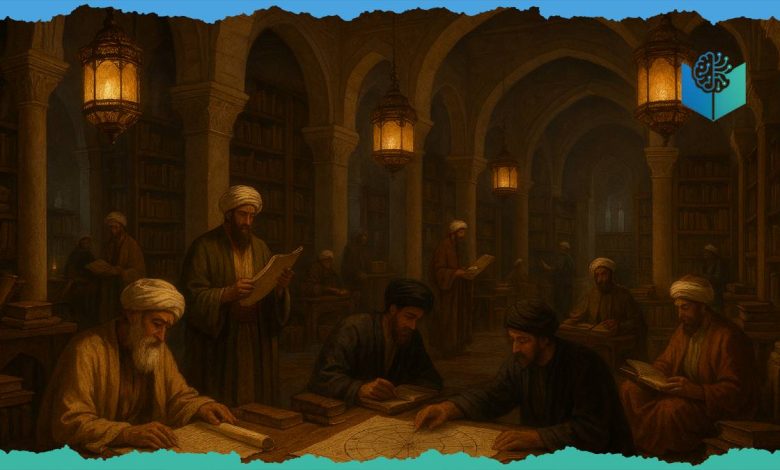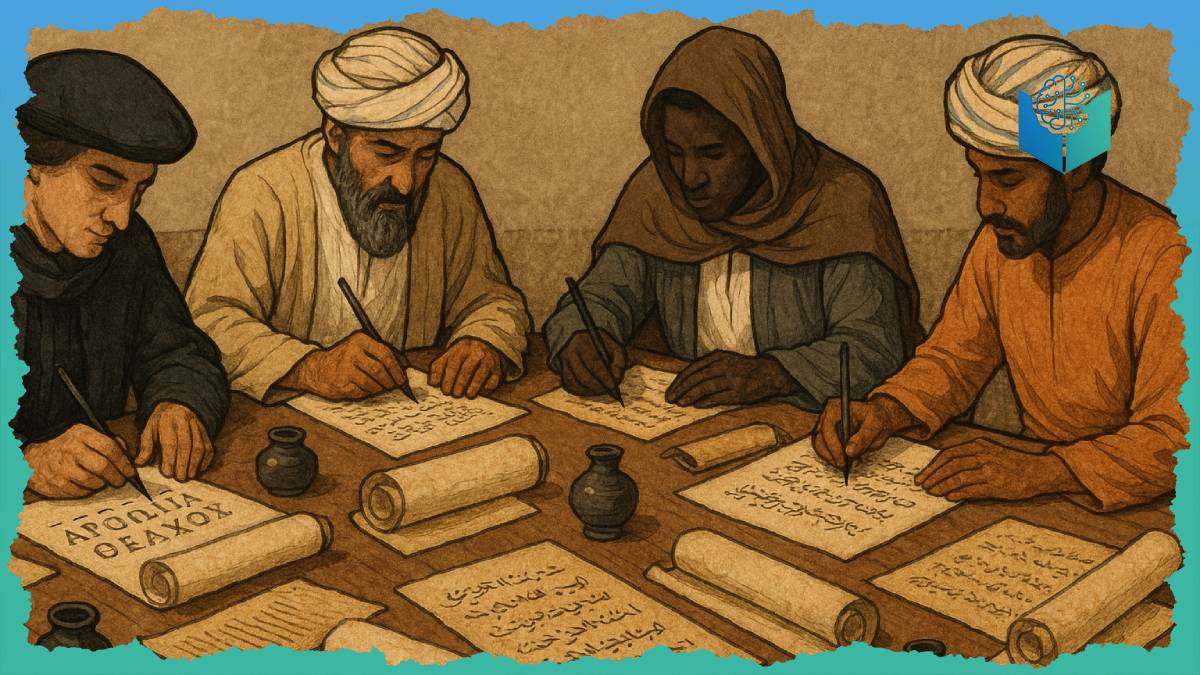Islamic Golden Age

The Islamic Golden Age stands as one of the most remarkable eras in human history, a time when knowledge, art, and science flourished under the light of faith. From the 8th to the 14th century, Muslim scholars, guided by the teachings of the Quran, made groundbreaking contributions that shaped modern civilization.
This was not merely an age of discovery, but an age of purpose where science and spirituality worked hand in hand. Through institutions, translations, and the pursuit of wisdom, the Muslim world became the intellectual hub of the globe.
The Birth of the Islamic Golden Age
The Islamic Golden Age began during the Abbasid Caliphate, particularly in Baghdad, which became the center of learning. The famous Bayt al-Hikmah (House of Wisdom) was established as a library, university, and translation center. Scholars gathered from across the world, Arabs, Persians, Indians, and Greeks, to translate ancient knowledge into Arabic.
This open exchange of ideas created a culture of inquiry deeply rooted in Quranic guidance, where Muslims viewed knowledge as a form of worship. As the Quran says:
“Say, ‘Are those who know equal to those who do not know?’” (Quran 39:9).
Knowledge was not separated from faith; rather, it was seen as a way to understand the signs of Allah in creation.
The Role of the Quran in Inspiring Scientific Curiosity
The Quran constantly calls believers to reflect upon the universe: the stars, mountains, rain, and the human body. This inspired scholars of Islam to explore nature not out of curiosity alone but as a form of devotion.
“Indeed, in the creation of the heavens and the earth and the alternation of the night and the day are signs for those of understanding.” (Quran 3:190).
Through this worldview, the study of science became an act of faith, a means of appreciating the divine order in creation. The spirit of the Quranic lifestyle encouraged observation, reasoning, and innovation as part of one’s responsibility as a believer.
Muslim Scientists Who Shaped the World
The brilliance of Muslim scientists during this era set the foundation for modern disciplines. Their discoveries in medicine, mathematics, astronomy, and chemistry are still acknowledged today.

Al-Khwarizmi: The Father of Algebra
Al-Khwarizmi’s works gave birth to algebra, a term derived from his book Al-Jabr wa’l-Muqabala. His system revolutionized mathematics, paving the way for modern equations and problem-solving methods.
Ibn Sina (Avicenna): The Genius of Medicine
Ibn Sina’s Canon of Medicine remained a central medical text in European universities for over 600 years. His studies on anatomy, psychology, and pharmacology made him one of history’s greatest physicians.
Al-Haytham (Ibn al-Haytham): The Pioneer of Optics
Often called the father of modern optics, Al-Haytham’s Book of Optics challenged Greek ideas and explained vision as a process involving light entering the eye, a revolutionary discovery.
Al-Razi (Rhazes): Master of Chemistry
Al-Razi introduced scientific experimentation in medicine and chemistry. He discovered alcohol and pioneered methods for classifying substances, setting the groundwork for modern chemistry.
These Muslim scientists worked not for fame, but to serve humanity and fulfill the Quranic command to seek knowledge.
Islamic Inventions That Changed the World
Many modern conveniences and discoveries trace their roots back to Islamic inventions. Muslim engineers and scholars developed innovations that bridged ancient science and modern technology.
The Invention of the Camera Obscura
Al-Haytham’s research led to the creation of the camera obscura, the early version of today’s cameras, demonstrating how light travels and reflects images.
Advances in Medicine and Hospitals
Muslims built the first hospitals with specialized wards and systematic treatment processes. The concept of bimaristan, a public hospital, was an Islamic innovation.

The Astrolabe and Astronomy
Muslim astronomers improved the astrolabe, a tool used to navigate by the stars and determine prayer times and the direction of the Kaaba. Their observations improved calendars and influenced European astronomy.
Water Clocks and Engineering Marvels
Ingenious Muslim engineers like Al-Jazari designed intricate machines, clocks, and water systems centuries before the Industrial Revolution.
Each of these Islamic inventions reflected a harmony between creativity and belief, proof that faith and innovation can coexist.
The Rise of Islamic Philosophy
Beyond science, the Islamic Golden Age witnessed a deep engagement with philosophy. Scholars sought to balance revelation with reason, inspired by both Greek thought and Quranic guidance.
Al-Farabi and the Virtuous City
Al-Farabi imagined an ideal society guided by divine wisdom, where justice, morality, and reason coexist, a reflection of Islamic philosophy centered on ethical governance.
Ibn Rushd (Averroes) and Rational Thought
Ibn Rushd championed the compatibility of faith and reason. His commentaries on Aristotle were later studied in European universities, influencing Western philosophy.
Through these thinkers, Islamic philosophy connected theology with science, making intellectual inquiry an integral part of faith.
The Contributions of Islam to Global Knowledge
The contributions of Islam extended far beyond the Muslim world. Through translation and exchange, Europe rediscovered lost knowledge that would later fuel the Renaissance.
Muslim scholars introduced modern scientific methods, observation, experimentation, and verification centuries before they became central to Western science.
Universities and libraries in Cordoba, Cairo, and Baghdad welcomed students of all backgrounds, symbolizing a universal love for wisdom. This pursuit of knowledge was a reflection of the importance of the Quran, which encourages learning and reflection upon the world.
The Relationship Between Science and Faith in Islam
In contrast to later European conflicts between science and religion, Islam viewed knowledge as unified. Science, philosophy, and spirituality were not rivals; they were partners in understanding Allah’s creation.
This harmony is rooted in the belief that everything in the universe reflects divine order. The Quran invites believers to think deeply:
“Do they not look into the dominion of the heavens and the earth and everything that Allah has created?” (Quran 7:185).
The Preservation of Knowledge and Translation Movements
One of the most remarkable achievements of the Islamic Golden Age was the translation of ancient texts from Greek, Sanskrit, and Persian into Arabic. This preserved the works of Aristotle, Galen, and Ptolemy that might otherwise have been lost.
These translated works were not just copied; they were expanded, criticized, and built upon. Muslim scholars refined existing theories and developed new fields of study such as algebra, optics, and chemistry.
In doing so, they created a bridge between civilizations and ensured that humanity’s collective knowledge was not lost to time.

Lessons from the Islamic Golden Age
The Value of Knowledge
The Islamic Golden Age teaches that knowledge is a sacred duty. As the Prophet Muhammad (peace be upon him) said, seeking knowledge is an obligation for every Muslim.
The Unity of Science and Faith
Muslim scholars proved that science and spirituality complement each other. Understanding creation is, in essence, a form of worship.
The Legacy of Tolerance and Exchange
The era thrived on cooperation among Muslims, Christians, and Jews, showing that learning flourishes in an atmosphere of respect and diversity.
The Decline and Continuing Influence
The decline of the Islamic Golden Age came gradually due to political fragmentation and invasions. Yet, its influence never disappeared. Its ideas were carried to Europe, inspiring the Renaissance and shaping modern science.
Today, the legacy of that era continues to remind Muslims that the Quranic lifestyle calls for curiosity, learning, and contribution to society.
Reviving the Spirit of the Golden Age Today
In today’s world of technology and information, Muslims have the opportunity to reconnect with the intellectual and spiritual legacy of their ancestors. The same curiosity that drove early scholars can inspire modern Muslims to engage in science, ethics, and community development.
Living by Quranic guidance means seeking balance, embracing progress while staying rooted in moral principles.
“And say, ‘My Lord, increase me in knowledge.’” (Quran 20:114).
This verse captures the eternal call for learning, one that shaped the Islamic Golden Age and continues to inspire those seeking truth today.
Conclusion
The Islamic Golden Age was not just a chapter in history; it was a movement of enlightenment born from faith. Through Muslim scientists, philosophers, and thinkers, the world gained invaluable knowledge that shaped the course of humanity.
Their legacy stands as a reminder that Islam encourages reflection, innovation, and compassion, all grounded in divine purpose.
To rediscover this heritage, platforms like ayaat.ai offer resources to learn about Islam, the Quran, and its timeless wisdom. By following this path, believers today can revive the same spirit that once illuminated the world, a spirit rooted in faith, reason, and the pursuit of truth.
Q&A
The Golden Age of Islam lasted roughly from the 8th to the 14th century. It was a period of great scientific, cultural, and intellectual flourishing across the Muslim world.
Muslim scholars invented algebra, advanced medicine, optics, and astronomical instruments. They also developed early forms of the scientific method and preserved Greek and Persian knowledge.
While it wasn’t exclusively Persian, Persian scholars played a major role in shaping it. Many key figures in science, philosophy, and literature were of Persian origin within the broader Islamic civilization. Which was the Golden Age of Islam?
What was invented in the Golden Age of Islam?
Was the Islamic Golden Age Persian?





